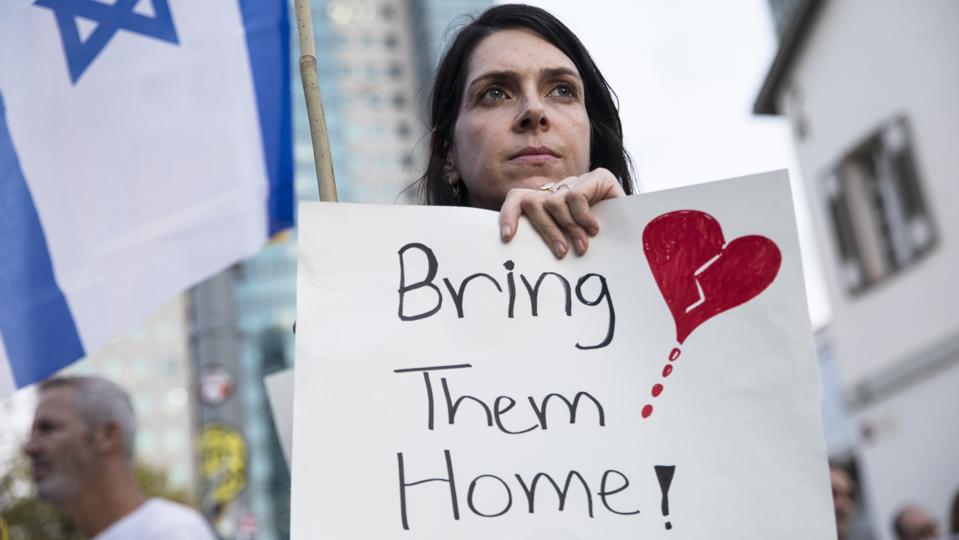Topline
Israel has reportedly agreed to a U.S.-brokered deal to swap hundreds of Palestinian prisoners for Israeli hostages, according to CNN and Israeli media, potentially a major breakthrough after weeks of fractious negotiations amid mounting international pressure on Israel to rein in its military campaign and allow more humanitarian aid into Gaza.
Key Facts
Israel will reportedly release between 700 and 800 Palestinian prisoners as part of the deal, around 100 of whom are serving life sentences for killing Israelis.
In exchange for the prisoners, Hamas will reportedly release 40 of the Israeli hostages being held in Gaza.
The breakthrough, which has not been officially announced or confirmed by either party, came after CIA Director Bill Burns suggested a compromise for the number of prisoners to be swapped for each Israeli hostage at negotiations in Doha, Qatar, according to CNN, citing reporting from its analyst Barak Ravid that has been confirmed by an unnamed diplomatic source.
The exchange will “definitely include some” of the American hostages still held in Gaza, Ravid said, explaining that the agreement will include the release of men over the age of 50.
Hamas has yet to agree to the proposal and could take up to three days to respond, according to Ravid, who said it “takes a long time” communicating details from negotiators in Doha to decision maker Yahya Sinwar, Hamas’ leader, who is “in a bunker some 100 feet under the ground” somewhere in Gaza.
Should Hamas agree, CNN said the exchange is likely to have “multiple phases,” with Hamas suggesting the release of women, elderly, sick and wounded hostages first.
Big Number
100. That’s around how many hostages taken by Hamas are still alive, according to CNN. Israel says around 130 hostages are still in captivity, though at least 33 of these are dead. The precise number, status and identity of the hostages in Gaza is not known and Hamas has repeatedly refused to provide a list of the living hostages.
Key Background
According to Israel, Hamas kidnapped 253 Israelis and foreigners on October 7 and the BBC says a total of 112 have been freed, as of February. This figure includes 78 Israeli women and children in an earlier deal between Israel and Hamas, five Israelis released in October, three Russian-Israelis handed over and 23 Thai hostages and one Filipino as part of a deal brokered between Hamas and the Thai government.
What To Watch For
The agreement has not been finalized and the diplomatic source speaking to CNN said a number of key issues remain outstanding. Foremost is the matter of how many prisoners will be released for each hostage, a perennial sticking point between Hamas and Israel that has stymied many previous negotiations. Though these reports suggest Israel’s stance has softened through its desire to see hostages released, it has aggressively dismissed previous demands to release hundreds of prisoners in exchange for hostages as “ridiculous” and “absurd.” Other key issues reportedly include the entry of aid and “Israeli military repositioning” in Gaza.
News Peg
Negotiations come amid increasing international pressure on Israel over its conduct in Gaza, where it has vowed to eradicate Hamas, seemingly at all costs and with no concrete plan for what happens after. In doing so, Israel’s military campaign has brought Gaza to the brink of collapse, obliterating critical infrastructure like hospitals, schools and water plants, killing tens of thousands of civilians and injuring tens of thousands more and displacing the vast majority of the 2.2 million-strong population. Experts and global officials warn catastrophic famine is imminent, particularly in the northern part of the Gaza strip, and Israel has come under heavy fire for its apparent refusal to allow substantive aid into the region, though the government rejects claims it is blocking humanitarian aid from entering Gaza. Criticism is now intensifying from the U.S.—one of Israel’s staunchest international allies whose global reputation has suffered from its failure to condemn Israel’s actions more forcefully—which tabled a U.N. Security Council resolution on Friday. The motion said it was “imperative” that an immediate and sustained cease-fire be implemented in Gaza. It failed following vetoes from China and Russia, whose diplomats criticized the vague language that didn’t demand an immediate cease-fire—merely that one was an “imperative”—and noted the U.S. had rejected previous resolutions that supported a cease-fire.

